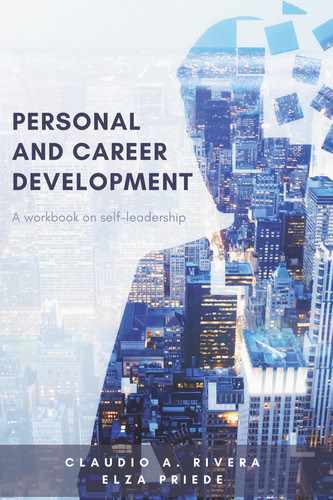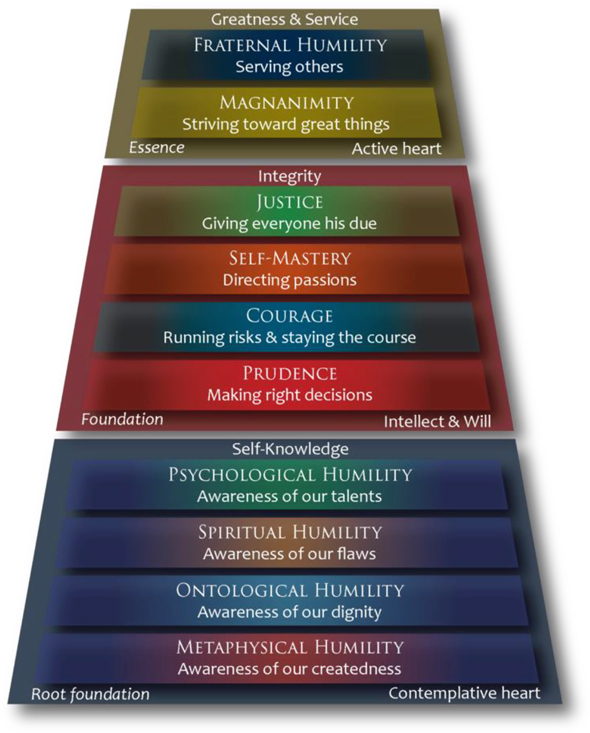Life Balance and Time Management
Introduction
Though the title initially refers to time management, the core of the chapter is emotional intelligence, which is one of the most popular topics in the personal development area since the 1980s.
Time management means essentially the capacity to set up the right order of priorities and, consequently, to put in order our daily agenda. In simple words, it implies to do the right thing, at the right time, and with the right doses.
This is the core of emotional intelligence: the capacity to rationally control our irrational impulses in order to deliver what is right. In our understanding, emotional intelligence as such is a misleading name, as emotional intelligence is broader than the control of our emotions. Therefore, we prefer to call emotional intelligence character-building.
After dealing with our life and career objectives in the long and short term, we felt it was important for you to see the impact of these big decisions in the present day. That is why, we include a short third part of the book that helps you live up to your priorities every day. The current chapter deals with the management of your emotions and character in order to keep you on track by yourself every day. The next chapter will deal with coaching, which is a tool you can use to receive the support we all need to keep moving forward on our development.
Emotional Intelligence
Though it seems old-fashioned, virtue—or good habit—is crucial to be a good leader. Daily virtue in action is the crucial input of emotional intelligence. It means the capacity to act according to our heart. Heart does not mean only according to our emotions, but according to the right combination of reason and emotions. As the philosopher B. Pascal said, “we arrive at the truth not by reason only, but also by the heart” (Pascal, Rogers, Cousin and Louandre 1861).
Emotional intelligence is a concept that was popularized by D. Goleman in 1998. It refers to “the capacity for recognizing our own feelings and those of others, for motivating ourselves, and for managing emotions well in ourselves and our relationships” (Goleman, 2006). Practically speaking, it is about knowing how you and others feel and what to do about it; knowing what feels good and what feels bad and how to get from bad to good; and possessing the emotional awareness, sensitivity, and the management skills that will help us to maximize our long-term happiness and survival.
During this chapter, we will outline some of the key insights about what emotional intelligence is and how to build it, and we will offer a couple exercises to assess it and practice it.
Summary of Emotional Intelligence
Emotional intelligence is just one type of intelligence among seven identified by Gardner: verbal or linguistic, logical or mathematical, visual or spatial, musical, bodily or kinesthetic, interpersonal, and intrapersonal, according to H. Gardner (Gardner, 2011).
Emotional intelligence is divided principally in two parts:
• Personal competence: It includes self-awareness and selfmanagement.
• Social competence: It is formed by social awareness and relationship management.
Emotional intelligence is an old concept, which is very trendy now. Plato, while describing the real and desired leader, implied already the importance of an appropriate level of emotional intelligence:
A man who combines good memory, readiness to learn, breadth of vision and grace, and be a friend of truth, justice, courage, and self-control. Aren’t they the only people to whom you would entrust your state? (Krell 1990)
Emotional intelligence is a practical competence, and for this reason, practice is necessary. If this practical skill is missing, a lack of self-control can happen, and this has enormous repercussions even in our social relationships.
In order to avoid that kind of problems, experts in emotional intelligence suggest to work on self-control mechanisms such as:
• Rules of behavior (I do not do X)
• Precommitment (agreeing to deadlines)
• Rationing (limiting consumption)
• Physical distance (e.g., alarm clock across the room)
• Mental budgeting (e.g., entertainment budget)
Character and Virtues
As we said in the introduction, emotional intelligence is what classical authors have called character-building. Character is the combination between the fixed part of our personality (coming from our inheritance and childhood experiences) and the negative and positive habits that we have developed during our lives.
Our personality does not substantially change from our early life onward; however, it can be molded, or it can become a dominant force in our lives. In simple terms, our habits will allow us to dominate our personality in order that we can fulfill our everyday duties properly or, if we have not developed positive habits, our personality will dominate us without us being able to fulfill everyday duties.
This is the reason why W. Bennis said, “Leadership is a metaphor for centeredness, congruity and balance in one’s life” (Havard 2007). Someone who wants to have control over his or her own everyday life needs strong character, what essentially means a strong base of virtues that is the right word for positive habits. The virtues that the classics suggested are the following (see figure 10.1):
Figure 10.1 Virtuous leadership
Source: (Virtuous Leadership Institute 2017)
The core virtues or cardinal virtues are prudence, courage, self-mastery, and justice. They represent the foundation of the edifice of our character, and they demand, in order to be complete, the virtues of humility and magnanimity. These virtues provide the tutor to modulate our personality and make us behave according to what we consider our right priorities.
In a letter to Lucilius, Seneca would say “It is the spirit that you should change and not the climate. Though you cross the immense ocean, your vices will follow you wherever you go. Why do you wonder that no journeys benefit you, if you always bring yourself with you? What is important is not where you go, but WHO YOU ARE when you go.” In the same way that companies could be schools of competences, life is the school of character we need.
Good Character Has Multiple Benefits
First, the virtues allow us to enjoy rewarding and productive lives. So, someone who has what is called solid character has a bigger sense of freedom in their actions. The reason is that they do basically what they want, as they have clarity in the process of decision making (virtue of prudence and magnanimity) but also because they have the strength to deliver what they have decided (virtues of fortitude and self-control).
The second benefit, the more people with good character, the healthier our society. Looking at our families and organizations, we can see that many of the projects that fail and many of the conflicts that arise are due to sloppy work, meaning where it has not been done with proper quality, it has been delayed, or it has not been done at the right time. Even when the process is standard and set, you can never regulate everything that people should do, every action that they should implement. That implies that the planning of processes does not replace the need of character.
Good character-building guarantees quality, at work and it guarantees life standards. Character brings order in life, and order takes care of people. So, when character is present, less remedial actions are needed in all life and professional aspects. Organizations and society need us to be reliable, meaning that we can deliver on what we promised. That is the core of integrity. Beyond ethical standards, integrity is consistency between our actions and our promises.
Fourth, virtues are universal, meaning that they are found in all great faiths, but they are not restricted to religions. There is plenty of evidence that across the major philosophical traditions around the world, character and virtues with different names and labels have been always considered for personal fulfillment and the flourishing of society. It means humanity has learned this upon the experience of thousands of years of civilization (Havard 2007).
Boston EI Questionnaire—An Exercise
In this exercise, you will be asked to do the Boston EI questionnaire1 to evaluate your current level of emotional intelligence (EI). When completing the survey, you will see the improvement opportunities. These questions will help you assess how you perceive your emotional intelligence.
Remember that for us, emotional intelligence is the display on the surface of our level of character-building. Therefore, this exercise will expose signals of the existence or lack of character. We will offer, after this questionnaire, two more exercises that explore your character even deeper, giving you a more appropriate assessment on where you stand at the level of virtues.
At the end of the day, all these exercises will give you a complete test of your character fit for undertaking the development of the vision and goals that you have decided in the previous chapters. It is like when you want to start a sport and they need to check your physical fitness first!
For each question, you are asked to circle the closest possible answer to your feelings. As always, try to be honest; otherwise, there is no point in doing it!
Conclusions
Self-Awareness
What can I do to improve?
What can I do to improve?
Self-Motivation
What can I do to improve?
Empathy
What can I do to improve?
What can I do to improve?
Seligman Brief Strengths Test—An Exercise
As said before, we want to offer one more exercise on character, which is the real reason behind your EQ level. Seligman (one of the most renowned experts in positive psychology) with his Penn University team has developed one of the most ambitious projects in terms of character: Authentic Happiness.
Seligman offers many tests, but we suggest you do one: Brief Strengths Test. It focuses on your self-perceived best qualities. The test is found online under the following link:
https://authentichappiness.sas.upenn.edu/user/login?destination=node/504
We have already touched upon the importance of positive psychology and Seligman’s ideas in the previous chapters—how you think about yourself has an impact on the way you contribute to yourself and other people.
Once you have completed the survey, you will be offered the results in comparison to other respondents. We encourage you to carefully read the results and write your own thoughts about them.
Conclusions from test
Now, please turn to the exercise in your personal and career journey “Leader’s Journal” and start filling in your roadmap “Brief Strengths Test,” as well as the conclusions from the tests.
In this chapter, we have in some way demystified the concept of emotional intelligence (EQ). On the one hand, we have highlighted its relevance, but on the other, the need to dig deeper on it understanding that EQ is not simply self-control, how to manage our emotions, but is rather what the Greeks called character-building.
In this chapter, we have also distinguished the differences between positive and negative habits and how to develop virtues that are the raw material of character. We understand that character is the real root of EQ and provides the personal strength in order to accomplish our previously decided goals daily.
We have also provided assessments and exercises that can help the reader to better understand these concepts. Character-building is in all regards the most important development path for any leader, as it is the only way to guarantee consistent growth and excellence in the long run.
1 Free of charge questionnaire available online. One of many sources: https://mtdsalestraining.com/wp-content/uploads/2013/01/Managing-Your-EQ-For-Better-Sales-Performance.pdf

